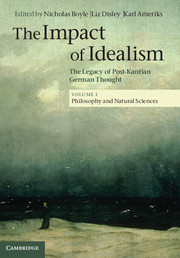Book contents
- Frontmatter
- Contents
- List of Illustrations
- List of Contributors
- Acknowledgements
- List of Abbreviations
- Foreword
- General introduction: the eighteenth and nineteenth centuries
- General introduction: the twentieth and twenty-first centuries
- Introduction: Idealism in the natural sciences and philosophy
- 1 Philosophy of natural science in Idealism and neo-Kantianism
- 2 The impact of German Idealism and Romanticism on biology in the nineteenth century
- 3 The unconscious: transcendental origins, Idealist metaphysics and psychoanalytic metapsychology
- 4 Nietzsche, Kant and teleology
- 5 Transcendental idealism, phenomenology and the metaphysics of intentionality
- 6 Heidegger and the impact of idealism
- 7 French Hegelianism and anti-Hegelianism in the 1960s: Hyppolite, Foucault and Deleuze
- 8 Scottish Idealism
- 9 ‘My station and its duties’: social-role accounts of obligation in Green and Bradley
- 10 Idealism and the origins of analytic philosophy1
- 11 Idealism and Pragmatism: the inheritance of Hegel's concept of experience
- 12 Reason's form
- Bibliography
- Index
- References
11 - Idealism and Pragmatism: the inheritance of Hegel's concept of experience
Published online by Cambridge University Press: 05 December 2013
- Frontmatter
- Contents
- List of Illustrations
- List of Contributors
- Acknowledgements
- List of Abbreviations
- Foreword
- General introduction: the eighteenth and nineteenth centuries
- General introduction: the twentieth and twenty-first centuries
- Introduction: Idealism in the natural sciences and philosophy
- 1 Philosophy of natural science in Idealism and neo-Kantianism
- 2 The impact of German Idealism and Romanticism on biology in the nineteenth century
- 3 The unconscious: transcendental origins, Idealist metaphysics and psychoanalytic metapsychology
- 4 Nietzsche, Kant and teleology
- 5 Transcendental idealism, phenomenology and the metaphysics of intentionality
- 6 Heidegger and the impact of idealism
- 7 French Hegelianism and anti-Hegelianism in the 1960s: Hyppolite, Foucault and Deleuze
- 8 Scottish Idealism
- 9 ‘My station and its duties’: social-role accounts of obligation in Green and Bradley
- 10 Idealism and the origins of analytic philosophy1
- 11 Idealism and Pragmatism: the inheritance of Hegel's concept of experience
- 12 Reason's form
- Bibliography
- Index
- References
Summary
German Idealism and American Pragmatism are closely related in a complicated way. Lines of comparison and influence can be drawn, but there are significant differences as well. Superficially, one might think that the biggest difference is that Hegel is a metaphysician whereas the pragmatists are not. However, Hegel was also a major critic of metaphysics, and the pragmatists were also concerned with many metaphysical questions and principles. The issue has become even more complicated because of the way that philosophers have referred to both traditions. Most of the neo-pragmatists, like Robert Brandom, have a close relationship not only to classical Pragmatism but also to Hegel. However, although one might be led from these affinities to the impression that Hegel and Pragmatism form a single tradition, this is not the case – at least not without certain restrictions. For various reasons, many contemporary philosophers tend to stress how closely related Pragmatism is to Kant and German Idealism. But one must also be aware of the critical distance of the pragmatists to Idealism. The role of experience is central to the philosophy of the pragmatists, and it is on this basis that they criticised a major feature of German Idealism.
In the first part of what follows, I will sketch the criticisms that the pragmatists voiced against German Idealism as well as the influence that they admitted it had on their own positions. In the second part I will turn to the specific relationship between Hegel and Peirce. I take this relationship to be an especially interesting example of a fruitful discussion between Hegel and Pragmatism. The third part will contain some concluding remarks.
- Type
- Chapter
- Information
- The Impact of IdealismThe Legacy of Post-Kantian German Thought, pp. 347 - 372Publisher: Cambridge University PressPrint publication year: 2013
References
- 3
- Cited by



